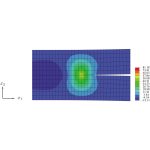AnalySwift receives NASA contract to Create a Computer Design tool to Unlock the Full Potential of Next-Gen Composite Materials

Wenbin Yu (CoE/AAE) will be conducting research thanks to an STTR contract from NASA to AnalySwift, which licenses Purdue IP.
AnalySwift Receives NASA Contract to Fund Research on Modeling Advanced Tailorable Composites, Partnering with Purdue University and University of Texas at Arlington
WEST LAFAYETTE, Ind. – For the second time in a year, commercial software provider AnalySwift LLC has received a contract from NASA to develop a design tool for tailorable composites and hybrid system materials.
The 13-month, $156,490 Phase I Small Business Technology Transfer (STTR) contract is for the dedicated project “Tool for Thermomechanical Design of Tailorable Composites and Hybrid System Materials.” It will fund research to be conducted at AnalySwift, Purdue University’s School of Aeronautics and Astronautics and the University of Texas at Arlington.
Allan Wood, AnalySwift CEO, said the company will have developed an efficient, high-fidelity computer tool at the end of the project. It will be capable of accurate, thermomechanical design of the materials beyond the traditional approaches for conventional composites.
“This research will benefit NASA by exploiting the full potential of tailorable composites and hybrid material systems,” he said. “They can endow lightweight space structures with reduced thermal sensitivity while retaining their strength and stiffness. Applications of interest to NASA include lightweighting exploration vehicles, space habitats and other space hardware, as well as enabling challenging performance characteristics.”
Wenbin Yu, professor in Purdue’s School of Aeronautics and Astronautics, said there are four challenges to designing tailorable composites and hybrid materials systems compared to conventional materials:
- They have curved and/or discontinuous fibers whose orientation varies by location.
- Their strength and stiffness vary by in-plane location.
- Their location-dependent strength and stiffness couple structural design with material design.
- They can be made through synergistic use of metallic alloys, short and/or continuous fiber reinforcements and a variety of matrices.
Wood said there are two main technical barriers to using tailorable composites and hybrid material systems to their full potential; both have to do with design tools.
“First, most tools are based on a theory and rules that rely on assumptions applicable to conventional materials,” he said. “There is a need for advanced design models capable of accurately modeling tailorable composites and hybrid system materials without ad hoc assumptions.
“Second, most works are aimed at solving simple problems involving idealistic structures, which result in special-purpose codes. There is a need for theories and codes that are ready to be integrated into third-party commercial codes like MSC Patran, NASTRAN and Abaqus for the design of real structures composed of these next-generation materials.”
Yu will be the primary investigator in the research to create the new design tool. Liang Zhang of AnalySwift and Xin Liu of the University of Texas at Arlington will be co-investigators.
“The final design tool will be broadly applicable to various NASA uses, including lightweight structures for antennas, landers, rovers and solar arrays; airframe technology like a hybrid/blended wing body; and highly fatigue- and damage-tolerant structures for vertical lift aircraft,” Yu said.
AnalySwift licenses Purdue University intellectual property through the Purdue Research Foundation Office of Technology Commercialization.
About AnalySwift
AnalySwift LLC is a provider of composite simulation software, which enables an unprecedented combination of efficiency and accuracy, including multiphysics structural and micromechanics modeling. Drawing on cutting-edge university technology, AnalySwift’s powerful solutions save orders of magnitude in computing time without a loss of accuracy so users can consider more design options and arrive at the best solution more quickly. The technologies deliver the accuracy of detailed 3D FEA at the efficiency of simple engineering models. SwiftComp is licensed from Purdue Research Foundation. VABS is licensed from Utah State University, Purdue Research Foundation, and Georgia Institute of Technology. Contact AnalySwift at info@analyswift.com.
About Purdue University
Purdue University is a top public research institution developing practical solutions to today’s toughest challenges. Ranked in each of the last five years as one of the 10 Most Innovative universities in the United States by U.S. News & World Report, Purdue delivers world-changing research and out-of-this-world discovery. Committed to hands-on and online, real-world learning, Purdue offers a transformative education to all. Committed to affordability and accessibility, Purdue has frozen tuition and most fees at 2012-13 levels, enabling more students than ever to graduate debt-free. See how Purdue never stops in the persistent pursuit of the next giant leap athttps://stories.purdue.edu.
About Purdue Research Foundation Office of Technology Commercialization
The Purdue Research Foundation Office of Technology Commercialization operates one of the most comprehensive technology transfer programs among leading research universities in the U.S. Services provided by this office support the economic development initiatives of Purdue University and benefit the university’s academic activities through commercializing, licensing and protecting Purdue intellectual property. In fiscal year 2021, the office reported 159 deals finalized with 236 technologies signed, 394 disclosures received and 187 issued U.S. patents. The office is managed by the Purdue Research Foundation, which received the 2019 Innovation and Economic Prosperity Universities Award for Place from the Association of Public and Land-grant Universities. In 2020, IPWatchdog Institute ranked Purdue third nationally in startup creation and in the top 20 for patents. The Purdue Research Foundation is a private, nonprofit foundation created to advance the mission of Purdue University. Contact otcip@prf.org for more information. The full press release is also available on PRF’s website.
Writer: Steve Martin, sgmartin@prf.org
Sources: Allan Wood, allanwood@analyswift.com
Wenbin Yu, wenbinyu@purdue.edu











